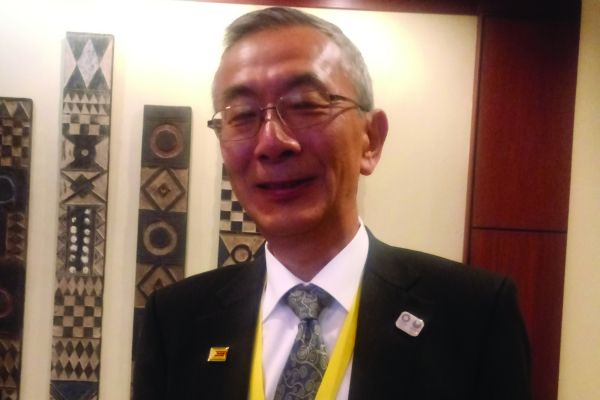
JAPAN has expressed readiness to improve trade relations with Zimbabwe, but urged the government to conduct free, fair, credible and peaceful elections next month. NewsDay (ND) business reporter, Mthandazo Nyoni, caught up with Japanese Ambassador to Zimbabwe, Toshiyuki Lwado (TL), who led a business delegation at the just-ended 2018 Zimbabwe National Chamber of Commerce annual congress in Victoria Falls. Below are excerpts of the interview:
By Mthandazo Nyoni
ND: What is your comment on the current state of trade between Zimbabwe and Japan?
TL: The current volume of trade between Japan and Zimbabwe is very small. In other words, there is a lot of potential to grow…..we are here to look into that.
I think, there are some Japanese cars coming here, but I’m not quite sure, really because those Japanese cars are coming from South Africa.
I’m not quite sure they are counted as the trade between Zimbabwe and Japan or not. Maybe it could be counted as Zimbabwe and South Africa. So many cars have been coming in the last five years, I know that, but it doesn’t really reflect over Japanese exports.
ND: What are you doing as Japanese Embassy to support Zimbabwe’s economic growth?
TL: The starting point, what we are doing as an Embassy is just to encourage the Japanese companies to come and talk.
- Chamisa under fire over US$120K donation
- Mavhunga puts DeMbare into Chibuku quarterfinals
- Pension funds bet on Cabora Bassa oilfields
- Councils defy govt fire tender directive
Keep Reading
That’s why today there are more than 10 Japanese companies attending and all of them are coming from South Africa. As JETRO [Japan External Trade Organisation] mentioned, there would be a mission next February and that is as a response to our request. So we are doing our best.
Actually after the election, I myself plan to go to South Africa to talk to Japanese companies there just to encourage them to come. So we are pushing very hard.
ND: Are we likely to see more Japanese investors coming to Zimbabwe since there is a new President?
TL: From the beginning, President Emmerson Mnangagwa’s statement is very good from our perspective. From his engagement with the international community he is talking about free, fair and credible elections and that there should be no violence, no corruption.
Those things are so nice. What is left to see is the concrete action to materialise what the President mentioned. If you ask anybody, any Zimbabwean “do you like violence?” they will say “no”. So how they demonstrate their real will — no violence, no corruption — and just try to engage themselves with the society, this is what we want to see.
And what is the role of the administration it will set up some rules and implementation over that.
So, we are very keen on some rules and some regulations and implementation of those issues. So that’s why I’m here to look at those things. And of course, the most important issue is the election.
I do hope and expect that the free, fair, credible and peaceful harmonised elections (would be held). That is very important for this country. I have no doubt about that.
ND: In the past we have seen investors shunning Zimbabwe due to human rights abuses, property rights issues and lack of the rule of law, among others. What is your take as Japan on this?
TL: We used to (have problems with these things), but at least now the political stability is being restored now. At least much better than last year and the economic situation is very difficult, but much better than the hyperinflation days.
So we want to see, probably the companies want to see how new administration will push to improve the situation. That is the key I think.
And also the issue is elections. Why am I talking about elections? It’s because political stability is the baseline. So based on that, there are some cash shortages and these are difficulties issues, but there are issues everywhere. As I mentioned, we are facing some difficulties and challenges domestically. So it’s quite normal to have challenges.











